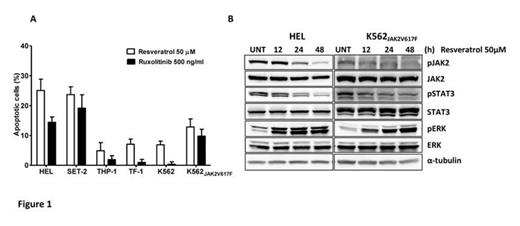Abstract
Resveratrol, a naturally-occurring polyphenol that has been extensively studied for its anti-inflammatory, cardioprotective and anti-cancer activities, has shown potential anti-tumor activities against malignant NK cells via JAK2/STAT3 pathway inhibition (Trung, et al. PLoS One, 2012). The inhibitory effect of resveratrol on the JAK2/STAT3 pathway suggests that it may be effective for the treatment of myeloid malignancies that are characterized by excessive activation of this signaling pathway, including myeloproliferative neoplasms with the JAK2V617F mutation. To test this hypothesis, we examined the anti-proliferative effects of resveratrol on JAK2V617F mutant myeloid leukemia cell lines, HEL and SET-2. Resveratrol inhibited the proliferation of these JAK2V617F mutant cell lines in a dose-dependent manner in the MTT (3-(4,5-dimethylthiazol-2-yl)-2,5-diphenyl tetrazoliumbromide) assay, and its inhibitory effects were 3.3-8.4 times greater than those on other myeloid leukemia cell lines without the JAK2V617F mutation, including K562, THP-1 and TF-1. The inhibitory effects on JAK2V617F(+) cell lines by 50 µM of resveratrol were comparable to those induced by 1000 ng/ml of ruxolitinib, a selective JAK1/2 inhibitor. Incubation of different myeloid leukemia cell lines at a resveratrol concentration of 50 µM or at a concentration of 500 ng/ml of ruxolitinib for 24 hours induced apoptosis in 25.1 ± 2.2%/14.4 ± 1.1% of HEL, 23.7 ± 1.5%/19.1 ± 2.6% of SET-2, 6.9 ± 0.7% /0.34 ± 0.41% of K562, 4.9 ± 1.6%/1.9 ± 0.7% of THP-1 and 7.1 ± 1.0%/0.99 ± 0.58% of TF-1 cells (Fig. 1A). Resveratrol inhibited the proliferation of K562 cells transfected with JAK2V617F (K562JAK2V617F) 1.68-times more than it did wild-type K562 cells (K562JAK2WT cells), and induced apoptosis in 12.9 ± 1.6% of K562JAK2V617F and 6.5 ± 0.5% of K562JAK2WT cells. The level of apoptosis induced in K562JAK2V617F cells by resveratrol (6.3±1.5%) was comparable to that (8.2 ± 2.1%) induced by 500 ng/ml of ruxolitinib. Resveratrol inhibited the phosphorylation of JAK1, JAK2 and Tyk2, but did not affect the phosphorylation of JAK3, PTEN or Akt, or their downstream target proteins, including STAT3 and STAT5 (Fig. 1B). In contrast to the inhibition of ERK phosphorylation by ruxolitinib in JAK2V617F cells, resveratrol dramatically enhanced the phosphorylation of ERK (Fig. 1B), which is known to activate caspase-3. The inhibition of the phosphorylation of JAK2/STAT3 and the upregulation of ERK phosphorylation by resveratrol were also observed in K562JAK2V617F cells (Fig. 1B). Resveratrol also induced robust G1 cell cycle arrest of HEL and SET-2 cells, and led to the downregulation of the anti-apoptotic protein, Mcl-1, as well as the upregulation of the pro-apoptotic protein, Bim, both of which play important roles in prolonging the survival of JAK2V617F cells. Moreover, 25 µM of resveratrol augmented the apoptosis in HEL cells induced by 400 ng/ml of ruxolitinib, leading to 2.7 times more apoptosis than ruxolitinib alone in the annexin V assay. These data suggest that resveratrol exerts a potent anti-tumor effect on malignant myeloid cells with the JAK2V617F mutation via both the inactivation of the JAK/STAT pathway and the upregulation of the ERK pathway. Increased ERK phosphorylation has recently been shown to induce apoptosis in several types of cancer cells (Nguyen, et al. Int J Oncol, 2008; Mustafi, et al. PLoS One, 2010). Thus, resveratrol may have therapeutic potential against myeloproliferative neoplasms with the JAK2V617F mutation, and also against other myeloid malignancies where the JAK/STAT pathway plays an essential role in their development.
Disclosures:
No relevant conflicts of interest to declare.
Author notes
*
Asterisk with author names denotes non-ASH members.
© 2013 by The American Society of Hematology
2013


This feature is available to Subscribers Only
Sign In or Create an Account Close Modal